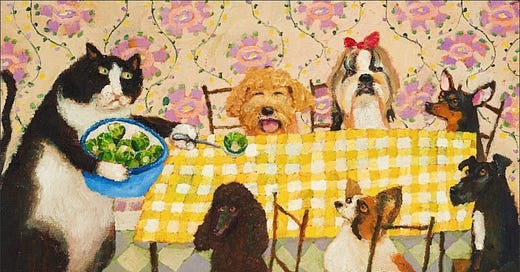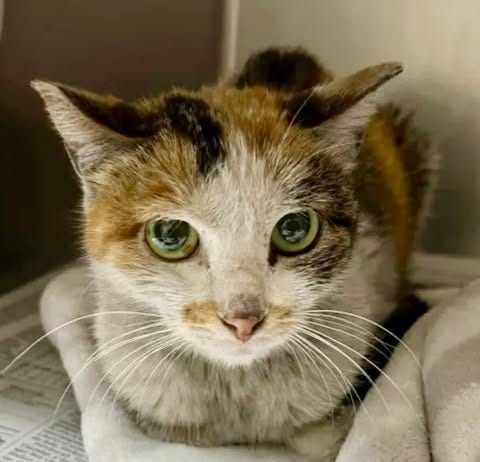
Organic pet food is about to take a hit
Also: Dakota Johnson's new rescue puppy, Ed the zebra's journey home, and Iran's dog walking ban.
The USDA is set to rescind its rules around organic pet food mere months after such standards were put in place to address inconsistency and confusion around the labeling of organic pet food.
In December, the USDA—which regulates the “organic” label—clarified that organic pet food would be distinct from organic livestock feed by allowing ingredients like:
Organic slaughter byproducts (bone, offal, gristle). These ingredients, which typically comprise a large proportion of the protein used in commercial pet food, are not allowed in organic livestock feed because these animals will later be consumed by humans.
Synthetic taurine. This amino acid is naturally present in raw meat but is destroyed in the heating process, so pet food manufacturers usually add a synthetic version of it to dry and wet food to meet nutritional standards.
The rules also clarified what could be labeled as “100% organic,” “organic,” or “made with organic [ingredient].”
At the time, the USDA said these amendments would help the organic pet food industry by reducing certifying confusion, thus increasing “the availability of organic products for consumers and bolster[ing] markets for organic ingredients by increasing demand.”
Now, the federal agency is reversing course and seeking to rescind these rules in full. The USDA said that doing so will remove the “paperwork burden” for pet food manufacturers. A representative for the federal agency did not immediately respond to a request for comment.
At least one major pet food advocacy group is sounding the alarm. The Pet Sustainability Coalition—which represents more than 200 pet product brands, including Hill’s, Royal Canin, Open Farm, and Ollie—has said that removing such rules will instead “reverse years of progress, increase regulatory confusion, and harm small businesses, processors, and pet food companies.”
“Since the rule’s adoption, many PSC members have begun sourcing organic ingredients and developing new products,” the group said in a statement last Thursday. “Rolling back the standard would derail these efforts, undermine innovation, and limit consumer choice—particularly for pet parents seeking the same quality of nutrition for their pets as for their families.”
Tl;dr: Without clear rules for organic pet food, manufacturers may have a harder time getting organic food and treats on store shelves. That will mean fewer choices for pet parents seeking organic options for their dogs and cats.
For more details on how pet food is regulated in the U.S. (it’s more confusing than you’d think!), read this Tail Mail deep dive on bird flu in pet food.
In other news…
Cactus, a rescue pup from California, threw out the first pitch at a Miami Marlins game.
It’s earnings season! Everyone is bracing for the full impact of the tariffs, as I wrote about earlier.
Chewy had a good first quarter, with net sales increasing 8.3% year-over-year to $3.12 billion. About $2.56 billion of those sales came from Autoship subscription orders.
Petco brought in $1.5 billion in net sales during this first quarter, down about 2.3% compared to the previous year. The company, which closed five stores in Q1, is forecasting a similar decline for the next quarter.
Bark (the company behind BarkBox and Bark Air, the private planes for dogs) reported a 5% decrease in revenue during the fiscal fourth quarter ending in March. That decline was due, in part, to the company pulling back marketing because of uncertainty around tariffs.
PetSmart reports earnings next week.
People in Iran still love dogs, even as government officials ban dog walking in at least 20 cities. Dog ownership is not banned, but Iranian officials are cracking down on people walking their dogs or traveling with their companions in a car. “Pets, including dogs, have become integral to Iranian family culture, even in religious households,” Dr. Damoon Ansari, a veterinary surgeon in Tehran, told the New York Times. “Whether officials approve or not, they cannot eliminate the millions of pets in Iran.”
Ed the zebra is back home. His owners, who don’t plan on getting any more zebras (…), say they hired a team from Texas to use a gator to chase Ed away from the road and into an open field. From there, he got airlifted out by helicopter.
A cat traveled all the way from China to Minnesota in a shipping container. The cat is now with the rescue Pet Haven and will soon be in a foster home, where she can recover from her three-week journey.
Actress Dakota Johnson adopted a new puppy, Tokyo, from a shelter in Santa Barbara. We love rescue dogs here at Tail Mail!
I’ll leave you with this final message from one of my favorite dog content creators, @mistermainer1.














